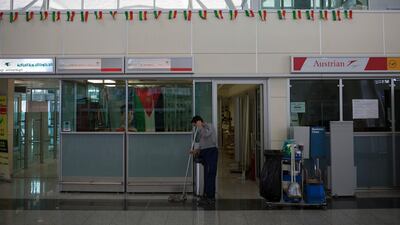Iraqi Kurdish authorities on Sunday filed a complaint to the International Civil Aviation Organization (ICAO) against Baghdad’s air embargo, saying it was blocking aid from getting to displaced people.
An embargo on international flights to and from Iraq's autonomous Kurdish region went into effect on Friday after Erbil rejected a call by Baghdad to surrender control of its international airports to the federal Iraqi government.
It comes amid growing tensions between Erbil and Baghdad after Iraqi Kurds voted in favour of separation from Iraq in last week's highly controversial referendum. Baghdad has repeatedly said the referendum was illegal.
“The Kurdish region in Iraq has filed a complaint to the ICAO against Baghdad’s air embargo [which] obstructs the transportation of humanitarian aid to internally-displaced people in the region,” said Hoshyar Zebari, a former Iraqi deputy prime minister and current member of the Kurdish region's referendum council.
Iraq’s northern region has been considered a safe haven for civilians fleeing the government's battle against ISIL extremists.
_______________
Read more:
As Erbil votes for independence, Syria's Kurds have plans of their own
Referendums in Catalonia and Kurdistan turn divisions into crisis
Iran, Iraq and Turkey 'co-ordinate' to take control of Kurdistan region's borders
_______________
"The airports are not only for travel and tourism but also to fulfil humanitarian needs of displaced civilians," Mr Zebari added, referring to the airports in Erbil and Sulaymaniyah.
The Kurdish parliament held a session on Saturday in which it rejected Baghdad's embargo, describing it as a move "against the people of the Kurdistan Region" and a “distraction from Iraq’s fight against ISIL”.
Mawlud Bawa Murad, the Kurdistan Regional Government's transport minister, said the ban would "negatively impact all international businesses in the Kurdistan region, in addition to all civilians”.
"We will do our best to find a viable alternative, or succeed to bring back international flights," Mr Murad said.
Despite the tensions between Erbil and Baghdad, Iraqi prime minister Haider Al Abadi on Sunday vowed to defend the country's Kurds from any attack, either internal or external.
"To our people in the Kurdistan region: we defend our Kurdish citizens as we defend all Iraqis and will not allow any attack on them," he said.
"We will not allow any harm to you and we will share our loaf of bread together."
His comments came after Iran said on Saturday it would hold a joint military exercise with Iraq on their shared border in response to the "illegitimate referendum".
Also on Sunday, Israeli prime minister Benjamin Netanyahu responded to allegations made a day before by Turkish president Recep Tayyip Erdogan that Israel’s Mossad spy agency played a role in the outcome of the Kurdish vote.
Mr Netanyahu denied the claims, saying: “Israel played no part in the Kurdish referendum, aside from the natural, deep and long-standing sympathy the Jewish people have for the Kurdish people and their aspirations.”
Hizbollah meanwhile said on Saturday that the Kurdish vote marked a first step towards partition of the Middle East, warning that this would lead to "internal wars" and must be opposed.
The head of the Iran-backed group, Hassan Nasrallah, said events in northern Iraq were a threat to the whole region — not just Iraq and neighbouring states with Kurdish populations.
"It will open the door to partition, partition, partition," Mr Nasrallah said, adding that "partition means taking the region to internal wars whose end and time frame is known only to God".


